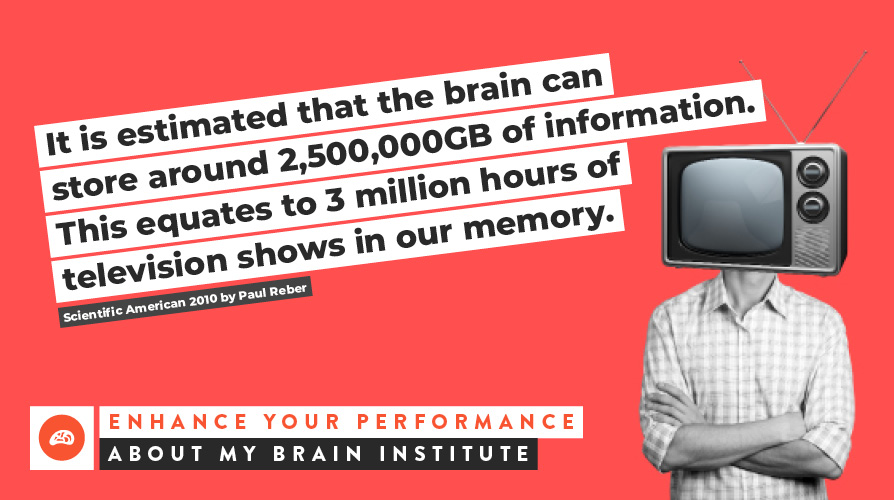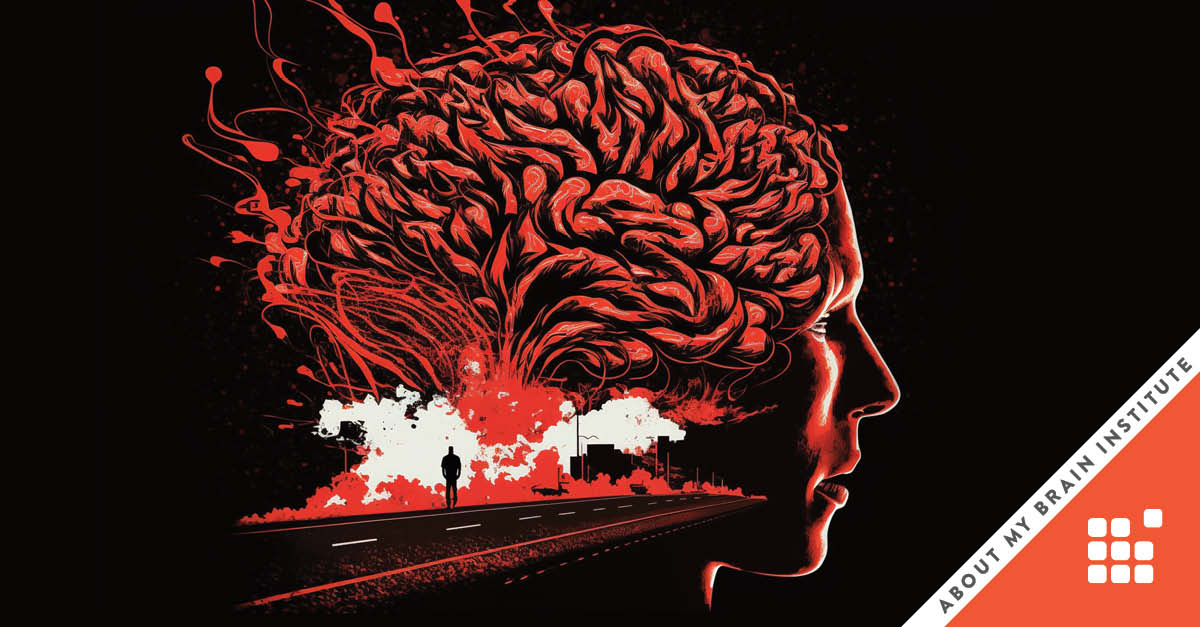How Your Memory Can Make Or Break Your Performance
Effective leaders are more efficient with a healthy brain, including the structures which handle memory. Recalling information quickly is essential when making decisions on the fly. By improving overall physical and mental health, leaders can increase performance with improved memory. While we can ‘Google’ many facts in a few seconds, being able to recall people, processes, feelings, and other pertinent information is critical for success in a fast-paced business world.
Our Brains Use Several Types of Memory
Memories can mean many things, and some memories can be deeply personal to each of us. A smell from childhood, a colour that reminds you of young love, or a favourite food item that has always brought comfort and a feeling of home--all of these are memories.
But we also process information about our external environment. We use our senses to detect and monitor all the things going on around us. We learn and remember things at school, home, and work. Our brain controls our internal environment (inside the body) and keeps things in relative harmony as often as possible.
Quickly accessing the information stored in the brain is important for everyday life. Much of the information we process during a typical day is not stored in any kind of long-term memory. So, how do we control what our brain ‘forgets’ and what we store forever? And, what is the limit to the human brain?
The History of Memory Research
Even before we could study the brain in a lab, we did see evidence of memory--or the lack of memory. Older people could tell stories of the past but struggled to remember the names of people they’d just met.
People have marvelled at how children seem to soak up knowledge, but the saying, ‘You can’t teach an old dog new tricks,’ has made its way into our everyday lexicon. Many have also observed the effects of diseases like Alzheimer’s, which seem to erase memories and thoughts of the people we know and love.
The study of memory from a scientific standpoint traces back to Hermann Ebbinghaus. He studied his own ability to memorise and then recall nonsense syllables for up to 31-day periods. He noticed he had a ‘first fleeting grasp’ of some of the bits of information but that he might not be able to recall them later on.
As technology progressed, so did the demands on memory. Telegraph operators (dating back to the 1850s) had to learn and use what became Morse code. These dots and dashes could convey whole conversations, but only to those who knew how to interpret them. Then telephones were invented in 1876. Now, phone operators had to learn telephone number systems to route calls properly.1
As our jobs started requiring more memory, scientists naturally became more interested in this type of research. Even though we have been peering into the brain for over a century, many of its secrets are still elusive.
Short-Term versus Long-Term Memory
As advanced as our understanding of the brain is, the reality is that we really don’t understand everything about how memory works. When we speak about memory, we must realise that our understanding is incomplete, and even as we learn more, we often produce more questions than answers.
First, let’s become acquainted with the terminology to understand how memory works. There are three types of memory; short-term, long-term, and working.
Short-Term Memory
Short-term memory is typically very brief and quite limited. It is also susceptible to interference, where new things that happen can overwrite or interfere with other items we are keeping in short-term memory.
- Typically, things in short-term memory can be recollected for 20-30 seconds. Some people can hold onto things a little longer (around 60 seconds). We can also ‘trick’ our brains by using a rehearsal strategy. Have you ever heard the Tommy Tutone song called ‘Jenny’? The phone number in the song (8675309) is very memorable for anyone who has heard it. Rehearsal strategies mean we repeat the information over and over or perhaps create a mnemonic to help us bring the information back. Singing information to a tune can also help us recall it.
- Older research from the 1950s stated that most people could remember seven bits of information, plus or minus one or two.2 More modern research suggests that we can most effectively handle about four chunks of information at once. Things like phone numbers, which are typically around 9-10 digits, are challenging to remember for long without a rehearsal strategy.1
Long-Term Memory
Long-term memory is our storage system for memories. The exact mechanisms for transferring information from short- to long-term are unknown. However, several theories may explain how this process occurs.3
- Atkinson-Shiffrin: This model suggests that memories move from short-term to long-term after a certain amount of time has passed.
- Information-processing: This view compares human memory to a computer. Information first goes into a temporary holding area and is then transferred to more permanent storage space (like information being saved in a temporary spot or on the hard disk).
- Some researchers believe we store both long- and short-term memories in the same spot, so a transference process isn’t necessary.
And... What is Working Memory?
Depending on whom you talk to or what papers you read, you might believe that short-term and working memory are actually the same, or you might believe there is a clear distinction between the two.
- Working memory means you can use the information (as opposed to simply storing it). For example, when assembling a piece of furniture, you constantly consult the directions. However, you will likely temporarily remember the instructions for the piece you are building because you are actively using that information. In contrast, short-term memory is holding on to that information but not doing anything with it. Since this is a rather fine distinction, the line is sometimes blurry when we discuss short-term and working memory.
- One model of working memory (Baddeley-Hitch) suggests two sides to working memory.4 We can store visual and spatial information in one part and auditory information in the other. These parts are brought together by the central executive, which controls everything and links both parts. A fourth part was added to this model in 2000, called the episodic buffer. This buffer links things with time, allowing us to keep things in order by when they occurred.
What are the Limits? How Far Can the Brain Go?
When we talk about the limits of the human brain, we first need to understand some of the terminologies. The numbers get large very quickly, so we have practical ways of describing these numbers.
- The first mission to the moon (Apollo 11) used a computer with 64 kilobytes (64 KB).1
- A typical iPhone has anywhere from 64 to 512 gigabytes (64-512 GB).
- 1 GB is equal to 1,000,000 KB.
- 1 terabyte (TB) is equal to 1,024 GB.
- 1 petabyte (PB) is equal to 1,024 TB.
A study in 2008 found that we are exposed to around 34 gigabytes of information daily.6 A study in 2017 found the number was 74 GB and that each year the number was growing by 5%.7 The older study also estimated that the average American adult was exposed to 100,000 words per day.
Compared to literature, Jane Austen’s Pride and Prejudice is around 122,000 words, and the entire seven-volume Harry Potter series has just over one million words. As these estimates are over a decade old, we are undoubtedly seeing and processing even more data each day.
Because we are inundated with information, facts, opinions, pictures, etc., each day, we don’t pay attention to everything around us. Instead, we pay attention to the most important things, and everything else drops into the background to be ignored or unnoticed. Selective attention means we focus on what we need to and filter out everything else. As our data consumption grows, learning how to filter out the information we don’t need successfully is an important skill to improve performance.8

Since we know we are exposed to incredible amounts of data, what can we really store? Research published in 2010 estimated that the brain can store around 2.5 petabytes (2,500,000 gigabytes). This equates to three million hours of television shows in our memory.
However, these calculations are challenging because estimating how much space one memory takes up is difficult. Plus, not all memories are equal; for some, we store more or less information.9
And as the years have passed, the time has grown longer. The sad truth is that what I could recall in five seconds all too needed ten, then thirty, then a full minute - like shadows lengthening at dusk. Someday, I suppose, the shadows will be swallowed up in darkness.
Haruki Murakami, Norwegian Wood
How To Improve Our Memory To Increase Performance
Exercise has been shown to improve our memory. When we exercise, we increase circulation. The brain is a very ‘hungry’ organ, so improving circulation means we increase blood flow and deliver the nutrients the brain needs to function properly.
Exercise also increases the production of specific molecules within the brain, including brain-derived neurotrophic factor (BDNF). The molecular promotes synaptogenesis, which means new synapses, or connections between brain cells, are created. The more BDNF in your brain, the better your brain capacity and memory will be.
The positive effects of exercise on stress are also thought to promote good brain health. When we exercise, we can decrease the number of stress receptors in the hippocampus. Fewer receptors mean the impact of stress hormones will be reduced, so stressful experiences won’t be as stressful as they could be.10
Does exercise help prevent memory loss associated with Alzheimer’s disease? According to the Alzheimer’s Society, physical exercise is one of the best things we can choose to do to lower the risk of dementia.
Recent studies have found that exercise in middle-aged people can lower the risk of dementia by around 30% and reduce the risk of Alzheimer’s by around 45%. One study assessed five behaviours (exercise, moderate alcohol intake, not smoking, healthy diet, and healthy weight) and found that people who practised four out of five had a 60% less chance of developing dementia.11
Regular exercise isn’t a perfect cure, but research shows that moving our bodies can improve memory and perhaps reduce the effects of memory loss associated with dementia and Alzheimer’s disease. Hopefully, as we continue to unravel the mysteries of these conditions, we can pinpoint exactly what we should do to lower our risks. Aging is part of human life, but perhaps we do not have to accept the ‘old dog can’t learn new tricks' mantra.
Overlapping Neurons Support Memory Integration
As we move through daily life, we require a certain amount of flexibility, where previous knowledge is applied to a different or new situation. In research, this flexibility is supported by memory integration or the process by which related memories become connected by overlapping neurons. Synaptogenesis supports this process as neurons reach out to each other, making that information more accessible.
The idea of memory integration has only recently been supported by empirical research. Trying to decipher these complex mechanisms has only become possible because of computer technology.12 For example, perhaps you see a woman and a dog walking in the park. Your brain records this information.
Then, a few days later, you see a man and the same dog walking somewhere else. Your brain will recall the dog and the woman from the other memory, and you might infer that the man and woman are somehow related (maybe a couple, maybe living together, etc.). Recognising patterns like this is vital to increasing our performance at work.
When we think of an activity like dancing, the movements become mapped into the brain. This creates a shorthand between the thinking and the doing--so we can just dance without thinking about each move.13 Dancers usually refer to this as ‘muscle memory’, but this phenomenon isn’t limited to just dancing. High-level athletes who use the same motions over and over also show muscle memory.
Muscle memory may also play a positive role in persons who have dementia or Alzheimer’s disease. A person might not recall how to play the piano, but someone might use muscle memory to play a favourite song. This also applies to daily tasks, such as getting dressed or brushing your teeth.
Your Memory Can Make Or Break Your Performance
The human brain is an endless delight in answers and questions. We answer a few things but uncover dozens of more questions. Technology will continue to advance, so our understanding of how the brain thinks and stores information will eventually be better understood. To become a neuroleader, it is important to stay informed about research and do our best to continue to learn about how our brains work.
We can increase our performance and improve our brain function with practice. Remembering phrases or sequences of numbers to music can help us recall them. We can exercise to increase blood flow and the molecules in the brain that stimulate synaptogenesis.
The goal of research is not only to learn these secrets but to improve the greater good of humanity. Our memories make us unique and add a rich variety to the lives of those around us. In the workplace, our memories give us an edge over others which can mean the difference between failure and success. Perhaps we should refuse to slip into that inevitable darkness and instead focus on keeping our brains healthy for as long as possible.
Citations:
- Cowan N. What are the differences between long-term, short-term, and working memory? Prog Brain Res 2008; 169: 323–338
- Miller GA. The magical number seven plus or minus two: some limits on our capacity for processing information. Psychol Rev 1956; 63: 81–97.
- Cherry K. What Is Short-Term Memory?, (accessed 28 August 2022).
- Chai WJ, Abd Hamid AI, Abdullah JM. Working Memory From the Psychological and Neurosciences Perspectives: A Review. Front Psychol 2018; 9: 401.
- What is the Memory Capacity of a Human Brain? Clinical Neurology Specialists, (2016, accessed 28 August 2022).
- Andrea H. The Human Brain is Loaded Daily with 34 GB of Information. Tech 21 Century, (2009, accessed 28 August 2022).
- Heim S, Keil A. Too much information, too little time: How the brain separates important from unimportant things in our fast-paced media world. Front Young Minds; 5. Epub ahead of print 1 June 2017. DOI: 10.3389/frym.2017.00023.
- Cherry K. How We Use Selective Attention to Filter Information and Focus, (accessed 28 August 2022).
- Reber P. What Is the Memory Capacity of the Human Brain? Scientific American, By Paul Reber on May 1 2010. Epub ahead of print By Paul Reber on May 1 2010. DOI: 10.1038/scientificamericanmind0510-70.
- McGregor G. How exercise affects the brain. Life Sciences, (2021, accessed 28 August 2022).
- Physical exercise and dementia. Alzheimer’s Society, (accessed 28 August 2022).
- Schlichting ML, Preston AR. Memory integration: neural mechanisms and implications for behaviour. Curr Opin Behav Sci 2015; 1: 1–8.
- Solway D. How the body (and mind) learns a dance. The New York Times, 28 May (28 May 2007, accessed 28 August 2022).
- i4 Neuroleader (353)
- Leadership & Culture (336)
- Brain Health & Wellbeing (206)
- Innovation (97)
- Performance (85)
- Our News (79)
- Collaboration (68)
- Agility (53)
- Practitioner Stories (44)
- In The Press (36)
- Make Me A Leader (33)
- Balance (31)
- Integration (30)
- Imagination (29)
- Awareness (23)
- Brain-Friendly Channel (22)
- Brain-Friendly Leadership (22)
- Communication (22)
- Curiosity (21)
- Inspiration (19)
- Intuition (19)
- Attitude (17)
- Courage (16)
- Adaptability (14)
- Case Studies (14)
- Drive (14)
- Generosity (13)
- Ethics (9)
- Mental Readiness (9)
- Influence (8)
- Retreat (8)
- Brain-Friendly Leadership (1)
- Oracle Cards (1)
- 1 November 2025 (2)
- 1 September 2025 (3)
- 1 August 2025 (5)
- 1 July 2025 (5)
- 1 June 2025 (2)
- 1 April 2025 (1)
- 1 March 2025 (8)
- 1 February 2025 (3)
- 1 September 2024 (4)
- 1 July 2024 (2)
- 1 June 2024 (6)
- 1 May 2024 (2)
- 1 April 2024 (3)
- 1 March 2024 (1)
- 1 November 2023 (1)
- 1 August 2023 (1)
- 1 July 2023 (2)
- 1 June 2023 (2)
- 1 May 2023 (4)
- 1 April 2023 (2)
- 1 March 2023 (7)
- 1 February 2023 (4)
- 1 January 2023 (1)
- 1 September 2022 (1)
- 1 May 2022 (3)
- 1 April 2022 (1)
- 1 March 2022 (5)
- 1 February 2022 (4)
- 1 January 2022 (4)
- 1 December 2021 (2)
- 1 November 2021 (4)
- 1 October 2021 (3)
- 1 September 2021 (6)
- 1 August 2021 (1)
- 1 April 2021 (1)
- 1 December 2020 (2)
- 1 November 2020 (1)
- 1 September 2020 (1)
- 1 August 2020 (1)
- 1 July 2020 (3)
- 1 June 2020 (4)
- 1 May 2020 (3)
- 1 April 2020 (4)
- 1 March 2020 (6)
- 1 February 2020 (4)
- 1 January 2020 (2)
- 1 December 2019 (3)
- 1 November 2019 (3)
- 1 October 2019 (5)
- 1 September 2019 (4)
- 1 August 2019 (4)
- 1 July 2019 (4)
- 1 June 2019 (5)
- 1 May 2019 (9)
- 1 April 2019 (9)
- 1 March 2019 (8)
- 1 February 2019 (7)
- 1 January 2019 (8)
- 1 December 2018 (5)
- 1 November 2018 (10)
- 1 October 2018 (16)
- 1 September 2018 (9)
- 1 August 2018 (10)
- 1 July 2018 (9)
- 1 June 2018 (8)
- 1 May 2018 (9)
- 1 April 2018 (9)
- 1 March 2018 (9)
- 1 February 2018 (8)
- 1 January 2018 (8)
- 1 December 2017 (6)
- 1 November 2017 (9)
- 1 October 2017 (9)
- 1 September 2017 (8)
- 1 August 2017 (10)
- 1 July 2017 (8)
- 1 June 2017 (8)
- 1 May 2017 (9)
- 1 April 2017 (8)
- 1 March 2017 (6)
- 1 January 2017 (3)
- 1 December 2016 (4)
- 1 November 2016 (5)
- 1 October 2016 (4)
- 1 September 2016 (2)
- 1 August 2016 (4)
- 1 July 2016 (4)
- 1 June 2016 (2)
- 1 May 2016 (3)
- 1 April 2016 (3)
- 1 March 2016 (7)
- 1 February 2016 (2)
- 1 January 2016 (5)
- 1 December 2015 (2)
- 1 November 2015 (2)
- 1 October 2015 (4)
- 1 September 2015 (2)
- 1 August 2015 (2)
- 1 July 2015 (1)
- 1 June 2015 (3)
- 1 May 2015 (4)
- 1 April 2015 (5)
- 1 March 2015 (3)
- 1 February 2015 (3)
- 1 January 2015 (3)
- 1 December 2014 (3)
- 1 November 2014 (3)
- 1 October 2014 (3)
- 1 September 2014 (5)
- 1 August 2014 (4)
- 1 July 2014 (5)
- 1 June 2014 (3)
- 1 May 2014 (1)
- 1 March 2014 (1)
- 1 December 2013 (2)
- 1 November 2013 (1)
- 1 July 2013 (1)
- 1 June 2013 (1)
- 1 May 2013 (3)
- 1 April 2013 (1)
- 1 March 2013 (2)
- 1 February 2013 (1)
- 1 January 2013 (2)
- 1 November 2012 (1)
- 1 October 2012 (1)
- 1 September 2012 (1)
- 1 August 2012 (2)
- 1 July 2012 (1)
- 1 June 2012 (1)
- 1 May 2012 (2)
- 1 April 2012 (1)
- 1 February 2012 (1)
- 1 January 2012 (1)
- 1 November 2011 (1)
- 1 October 2011 (3)
- 1 September 2011 (2)
- 1 July 2011 (1)
- 1 June 2011 (1)
- 1 May 2011 (1)
- 1 April 2011 (1)
- 1 March 2011 (1)
- 1 February 2011 (2)
- 1 January 2011 (4)
- 1 December 2010 (4)
- 1 November 2010 (3)
- 1 October 2010 (5)
- 1 September 2010 (4)
- 1 August 2010 (4)
- 1 July 2010 (3)
- 1 June 2010 (4)
- 1 May 2010 (7)
- 1 April 2010 (5)
Subscribe by email
You May Also Like
These Related Stories

How Energy & Vitality Enhance Your Performance

Dance Your Way Into A Healthy Body And Mind



No Comments Yet
Let us know what you think